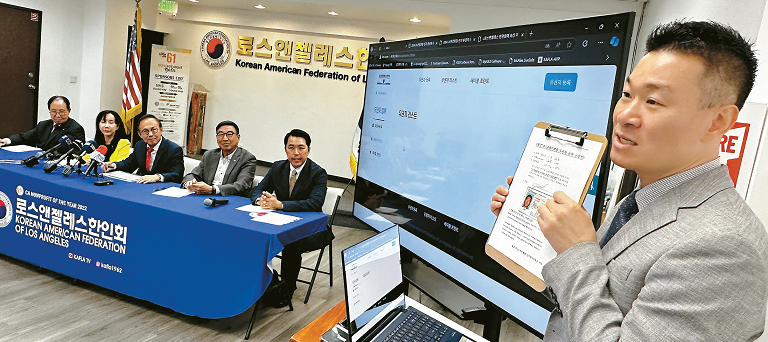The official schedule for the 37th election of the Korean American Federation of Los Angeles (KAFLA) president has begun. On October 22, the Election Management Committee held a press conference to announce the detailed plans for the coming election. The committee distributed the necessary candidate registration documents at the KAFLA building from October 23 to 25, with the official registration open for only one day on November 6.
Candidates are limited to U.S. permanent residents or citizens who meet the criteria. They must have resided in Los Angeles County for the past ten years as of the registration deadline and should have served as a KAFLA board member for at least two years during the past decade, or held an executive position (such as chairperson, vice-chairperson, president, or vice-president) in a registered nonprofit organization in California for at least three of the past seven years.
To register as a candidate, a $50,000 deposit must be submitted, with an additional $80,000 required to cover election expenses if the election proceeds. Candidates are allowed to raise campaign funds, which can be done from the moment they receive their registration documents until three days before the registration deadline. Donations can be made via check or online transfers (e.g., Venmo, Zelle, PayPal), with a maximum contribution of $1,500 per household, including businesses.

As of 2 p.m. on October 25, only one person had picked up the registration documents: Robert Ahn, an LA city commissioner and KAFLA board member. Steve Kang, another potential candidate who was considered a strong contender, reportedly decided not to run after being appointed as an LA city public works commissioner.
At this point, it appears that Robert Ahn will likely be the sole candidate for the position. If more than one candidate registers, an election will be held on December 7. However, if only one candidate meets all the qualifications and there are no issues with the paperwork, that candidate will automatically be declared the winner.
The election committee estimates that between 20,000 and 40,000 Korean Americans could participate in the election if it proceeds. To minimize the inconvenience of in-person voting, the committee has prepared a mail-in voting system. Voter registration is available through various methods, including online, email, text, fax, and in-person registration.
Holding the election, however, comes with significant costs. If there is only one candidate, the election will not be held, eliminating the financial burden of conducting the vote.
What remains disappointing about the current election plan is that the excessive cost of running for the KAFLA presidency has not been addressed. The current regulations create a high barrier for potential candidates. If a contested election takes place, each candidate is expected to spend hundreds of thousands of dollars. They must pay $130,000 in total to the organization—$50,000 for the deposit and $80,000 for election expenses—and additional campaign promotion costs. This means that individuals with the ability and passion to serve but without significant financial resources may be discouraged from running.
Therefore, starting with the next election, it is worth considering lowering the deposit and shifting from a direct election to an indirect one. While the direct election system may seem ideal in principle, its practicality is questionable. The election requires a substantial financial commitment, and if the race becomes heated, it could result in lingering tensions within the community.
After all, while the Korean American Federation is a significant organization, it is not a governing body. It operates as a volunteer-based organization, which raises the question of whether holding a full election is truly necessary to select its leader. Direct elections have not occurred over the past twenty years.
Given this, changing the election regulations altogether should be considered. Instead of a full election, the criteria for candidate registration could be made more stringent, focusing more on qualifications, experience, and reputation. I hope the next president will consider improving the election regulations.
By Mooyoung Lee [lee.mooyoung@koreadaily.com]




